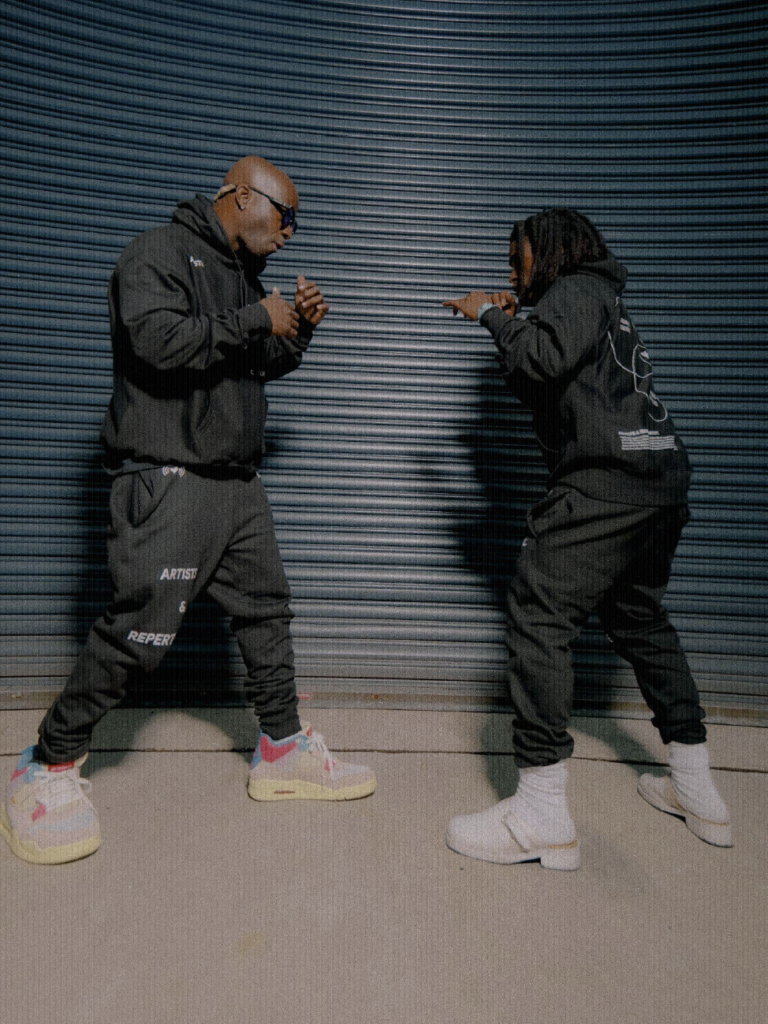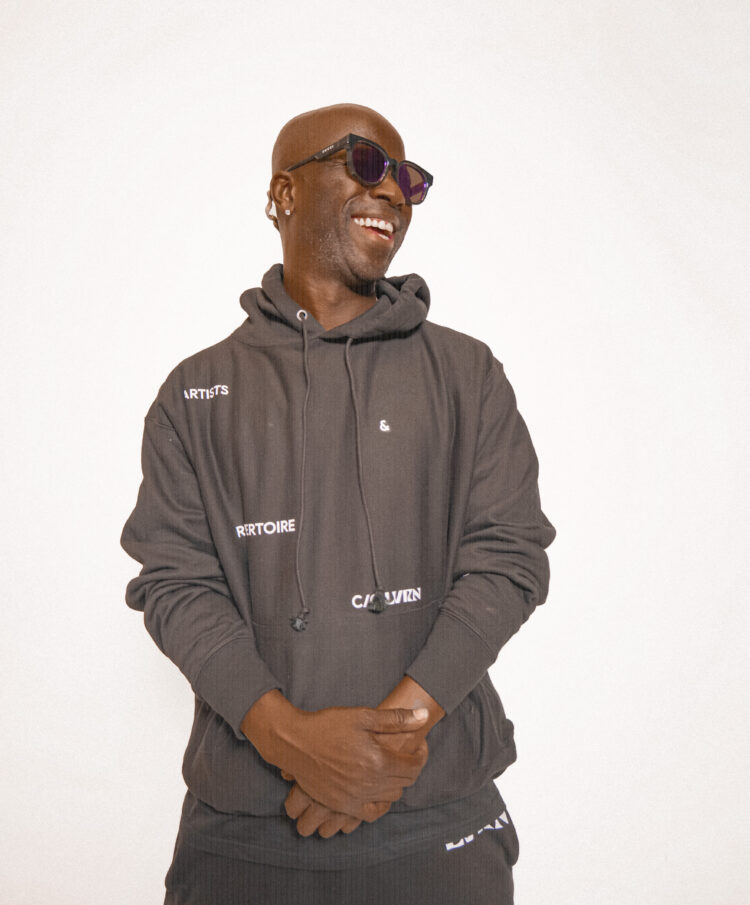Bryan-Michael Cox likes to refer to himself as “The Marathon Man.” It’s a nickname XXL gave him in a circa 2006 interview, and it’s even more fitting 17 years later.
Cox first made his mark in the music industry at 21 as a co-writer and co-producer of Houston-based R&B group Ideal’s 1999 hit “Get Gone.” The breakup anthem peaked at No. 13 on the Billboard Hot 100 chart and spent 22 weeks on the highly competitive chart. It was Cox’s first song he produced professionally, along with Ideal’s other track, “Creep Inn.”
Since then, the Grammy-winning songwriter/producer has run a well-paced race in the music industry, scoring victories with artists such as Usher, Mariah Carey, Mary J. Blige, Jagged Edge, Ari Lennox and many others.
Nearly 25 years after his first placement, Cox shows no signs of slowing down. In fact, he’s energized for the next chapter of his illustrious career, which includes tapping into the executive side of the music industry. “I’m enjoying this particular space that I’m in — this era of what I’m doing,” he declares. “It’s crazy because it doesn’t even feel like it’s been 25 years.”
In February, it was announced that Cox had been appointed senior vice president of A&R and executive producer at Love Renaissance (LVRN), the boutique label and management company based in Atlanta, Georgia. LVRN’s roster includes 6LACK, Summer Walker, Alex Vaughn, and Eli Derby.
In a previous statement, Justice Baiden, LVRN’s co-founder, said, “A&R has become a lost art in this new generation of music because of the gap in the relationship between A&R, the artist, and the label. Bryan-Michael Cox is a respected and accomplished producer and executive, and he’s the perfect addition to our team to help continue in bridging that gap.”
View this post on Instagram
Cox’s new role entails breaking new talent, developing LVRN’s current roster and executive producing all its in-house projects. “I’m super happy to be a part of the team and the company,” Cox tells Rated R&B over a video call one early afternoon in April. “I think they’re brilliant in every way — how they approach artistry, marketing [and] making music. I’m just extremely happy to be a part of what they’re doing and happy to help them build even bigger.”
Cox’s pathway to his new executive role at LVRN has been years in the making, intentionally. Nearly 20 years ago, long before LVRN, Cox held an A&R title at Arista Records while working on Usher’s Confessions album. While having a title was nice, Cox admits his heart wasn’t set on the administrative side back then. Instead, he was content with being behind the boards.
“I was just a glorified staff producer [and] they gave me an A&R title,” Cox reveals. “I wasn’t really active in the building. I didn’t really give two sh*ts about marketing and nothing like that,” he adds.
Today, Cox is in a different head space. Those who follow Cox on social media may see him regularly amplifying works from his collaborators. He’s one of those creators who enjoys being involved in different aspects of the music, not limiting himself to just studio sessions. Last year, we saw Cox, along with longtime collaborator and friend Jermaine Dupri on the promo trail for dvsn’s fourth album, Working On My Karma.
Cox, who previously worked with the R&B duo on A Muse In Her Feelings, co-wrote and co-produced multiple tracks on Working On My Karma, including the lead single “If I Get Caught.” He even joined them for interviews, including Rated R&B’s, where they addressed and defended the song’s ‘toxic’ theme. That’s just one recent case of many where we’ve seen Cox in the trenches with artists outside of the studio.
In Rated R&B’s interview with Bryan-Michael Cox, the legendary songwriter/producer talks more about joining LVRN, artist development, other projects he’s working on (such as Usher’s next album) and more.

Congratulations on your new role as SVP of A&R and executive producer at Love Renaissance (LVRN). What attracted you to the company?
For me, it was the spirit of Love Renaissance. I have been orbiting their planet for some years now. I tried not to go down to their world and be like, “Oh, I’m Bryan-Michael Cox, and I’m coming to absorb your world.” I wanted to be a part of it, almost like a bystander. I wanted to experience it. I wanted to party with them. I always thought they were brilliant.
It seems like it was an organic relationship with LVRN that developed over time. At what point was it determined that you were ready to contribute to their world?
So, you get to 2022; we’re finishing the dvsn album [Working On My Karma]. We’re marketing the project. We’re working closely with Justice [Baiden], Tunde [Balogun], Amber [Grimes], and the whole team. At this point, we’ve built a proper relationship. I had been talking to different labels ’cause I was doing production for artists throughout that year that were emerging, like Coco Jones and Kennedy Stephens. People running these labels would see me in action and be like, “Oh, snap. You really do this. You really produce vocals.” I’m like, “Y’all know how old I am?” (laughs). Coming from that is what we had to do. I started getting offers like, “Yo, we need people like you with experience to come in… let’s figure out a position for you.”
When these conversations started happening, I started [thinking about] what I really wanted to do. I wanted to be in a space where I could be active in developing, marketing and helping producers as I transition and grow in this business. Justice and I were having a conversation one night. He was trying to figure some stuff out, and I was giving him suggestions. It felt like I needed to speak up at that moment and say, “Yo, I’m having conversations with these labels, but I’d rather come over here ’cause I like newness and fresh ideas. They seem fearless. The strategy game is crazy. The marketing game is crazy. The artists are different.” I said, “If they would have me, I can bring some wisdom and things to the table.” The planets aligned, and the relationship has been a beautiful one. I wanted to be in a space where I could learn, and it could be a reciprocal thing when it came to teaching; they are teaching me a lot. I’m really grateful for everybody.
Speaking of teaching, are there any execs you have turned to for advice?
Absolutely. My manager Christopher Hicks was a top executive at Warner Chappell, Atlantic [Records] and Def Jam. He’s now working very closely with [Quality Control]. I speak to him on a regular. LA Reid has been a source of inspiration and advice in conversation. We’re making Usher’s album in the middle of all this stuff happening. I’m able to pick up the phone and be like, “Hey, what do you think about this?” Most of my friends are executives. I have attorney friends I’ve been able to lean on. I have a proper village.
There have been talks within the industry about how there are so many songs out, yet not many stars are being made. As someone trying to break talent, what qualities do you look for in making a potential star?
It always starts with the artist and the potential of an artist. If you find somebody special, that’s great, but even in that space — artist development. The difference between what we are doing and what we’re gonna do with our future artists is we’re not only depending on data. We have to look at it and have to abide by it. Ultimately, if you find an artist that’s moving and shaking with the data, the lack of artist development is why the stars that you’re talking about don’t exist. Artists like Michael Jackson, Usher, Beyoncé and Chris Brown are the product of artist development; they were great when they were kids.
I was a child when I started producing records. It didn’t break for me until I was a teenager. I was 13 when I first started making records. I had to be developed. Rodney Jerkins started when he was very young. Somebody had to pour into him. His dad had to pour into him, and he had to be developed. We could be naturally great musicians, but then you gotta work at it. You make your first hot joint; that’s your foundation. Like, “Okay, boom. I know I can make a hot, crazy track. I can write a really good song. Now, that’s where I’m building from.” It’s artist development. That’s literally the ingredient that is missing in this instant gratification generation.
As the executive producer on all in-house works, you have your hands on different projects. How do you allocate your time and energy to the different artists on the roster?
I really like the artists we have. It’s not like, “Oh man, I gotta work with this artist. Oh, I gotta listen to this music.” I love Summer [Walker]. I love 6LACK. I was a big fan of them before all of this; that in itself is a beautiful thing. It kind of makes it easier for me to engage them. For our emerging artists, I just try to make myself available as an executive. That’s the reason why I chose to rock with LVRN because it’s a smaller, more intimate situation where I could build proper relationships with the future of these artists.
As a creator and an executive producer, how do you weigh your creative input with the artist’s creative input?
I am learning that as I go. The one thing I understand — and I’ve always had as a producer — is that it’s about the artist [and] the best scenario. Even if it’s music you don’t quite understand or rock with, you have to be outside of yourself and cognizant of the artist [and their] audience who we [are] trying to get it to. I understand that it’s about the artist. I’m just a vessel to help the artists get to the destination they’re trying to get to.
How do you juggle being an executive with writing and producing for others? Are you now more inclined to produce and write for the artists on the LVRN roster, or are you still open to working with other artists?
The producer-songwriter in me is why I’m the A&R executive and executive producer. So producer-songwriter is always gonna take precedence. That’s the skill that got me in this space. It’s the way I’m able to navigate those different hats. It feels like I don’t have enough hours in a day now. Time management is the only thing that I’m trying to grasp a hold of, [but] I’m still making records. We’re finishing Usher’s album. I’m going in with PinkPantheress [and] Koryn Hawthorne. I’m never going to not produce records. I’m also a person that just loves to be busy. I hate idle time. If I’m taking a vacation, cool. That’s the only time I am idle. But if my workday’s not full, I feel like I’m not doing enough to get to the next level.
What’s next for you and who are some artists we should watch out for?
Alex Vaughn. Keep streaming The Hurtbook. We got the Homegirl Pack out. We are in discussions and figuring out what the Homeboy pack will look like. Hopefully, we can get that particular concept off the ground. I’m working with an artist name SadBoi. She’s Jamaican from Toronto. Her vibe is ridiculous. Äyanna, she’s a Jamaican woman from London. Our pop princess. She’s phenomenal. North Ave Jax – I think he’s dope. These are artists that I’m really full-fledged with. On the production side, me and Jermaine [Dupri] just went into the studio with this artist named yvngxchris signed to Columbia [Records].




